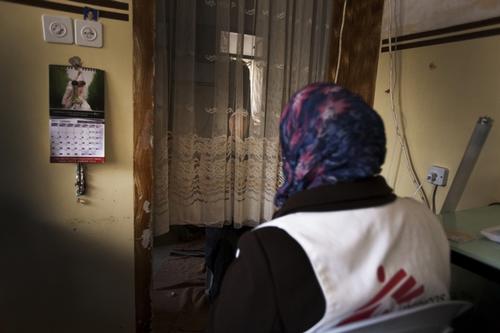This piece is part of a series of stories about MSF patients affected by the Israeli-Palestinian conflict, and who receive assistance from MSF mental health teams in Hebron and in East Jerusalem. The stories are collected by the MSF teams and seek to reflect the reality of daily life under occupation for MSF patients and the people who treat them.
Hadi is eighteen years old and leads the typical life of a teenager in a refugee camp in East Jerusalem. Like many other youngsters in Palestine, Hadi dropped out of school two years ago to work and help support his six-member family. His father doesn’t work because he suffers from chronic health and psychological problems, so Hadi and his older brother are practically the sole providers for the family. “I left school because the education was bad and at the same time I wanted to help the family and try to build my future too,” he says.
Beaten unconscious
But Hadi has been detained at his home for a year now. He was arrested at the checkpoint that separates the camp from the city of Jerusalem over a year ago, where there were confrontations between Palestinians and the soldiers stationed at the checkpoint. He and a friend were watching what was happening, when suddenly they were surprised by the secret intelligence force (Musta’reben) who arrested him and his friend. They were beaten unconscious and Hadi woke up to find out that he was in hospital, surrounded by guards. He was taken for interrogation at a detention centre.
He was released after 5 days of detention and interrogation at the prison. His parents bailed him out after paying 16,000 shekels (more than 3,300 euros) that they had to borrow from relatives and friends, and he was placed under house arrest until a court date was set to decide on the charges against him. His mother is responsible for him: “Many times I feel that I am playing the double role of prison guard and mother, and there is a contradiction between the two roles; on the one hand I want to protect him so he doesn’t break the terms of his arrest and get arrested, and on the other hand my heart bleeds when I see him in front of me, unable to leave the house and in a constant state of stress.”
Psychological help
Now, with the help of a Médecins Sans Frontières (MSF) psychologist, Hadi is able to receive some of the help he desperately needs. The psychologist who works with Hadi sums up his psychological condition: “He was very troubled and had many psychological reactions from not being able to control his own destiny, especially because he didn't know for how long his house arrest was going to last. There were many moments of stress with the family members, as he got angry at the others because they can leave the house but he can’t. He was in a constant state of suspicion that could lead to obsession or paranoia, he felt that he was being watched by the neighbours. And the problem got worse because the police often called him so he knew he was being watched. So he was in a state of constant psychological alertness, exhausted.” Hadi says: “Many times I think of breaking the terms of the house arrest so that I will get arrested and go to prison. At least in prison there are common circumstances with the other prisoners, and I know when I go in and when I get out and I will arrange my thoughts and future planning accordingly, not as it is right now, I am in a state of helplessness and I have lost trust in everything.”
Building an intervention plan
From a therapeutic intervention, the counsellor builds an intervention plan with a psychosocial orientation that will allow Hadi to take the lead to feel in control of his destiny and to come out of his state of helplessness. The plan depended on encouraging him and enabling him psychologically to increase his motivation to change his reality. The counsellor also helped him to raise his awareness in regards to the psychological reality he lives in.
Currently, he is still under house arrest and there are legal indicators that he will be sentenced soon and will actually be arrested. But he says: “Now I can tell you that I won’t allow anyone to strip me of my humanity. I won’t become a violent angry person and I will defy my reality because this is not my destiny no matter what the future circumstances are.”
House arrest in Palestine dates back to the British mandate period when it was used against the Palestinians. Israel then adopted it after occupying the West Bank and Gaza Strip in 1967, and it was used infrequently and with different age groups. However, it is noticeable that the house arrest of Palestinian minors has increased in recent years especially in East Jerusalem, under direct Israeli occupation.



